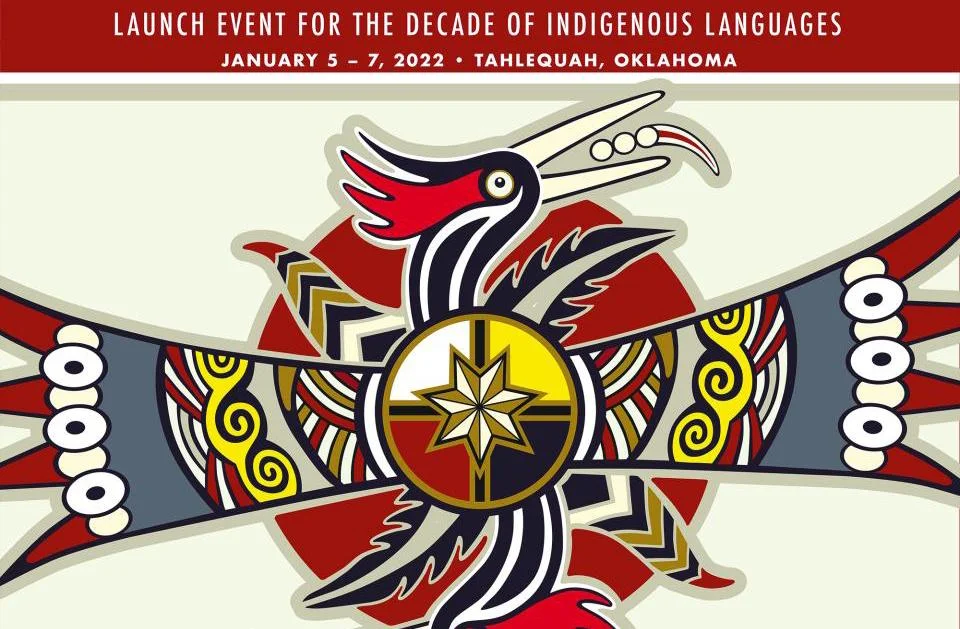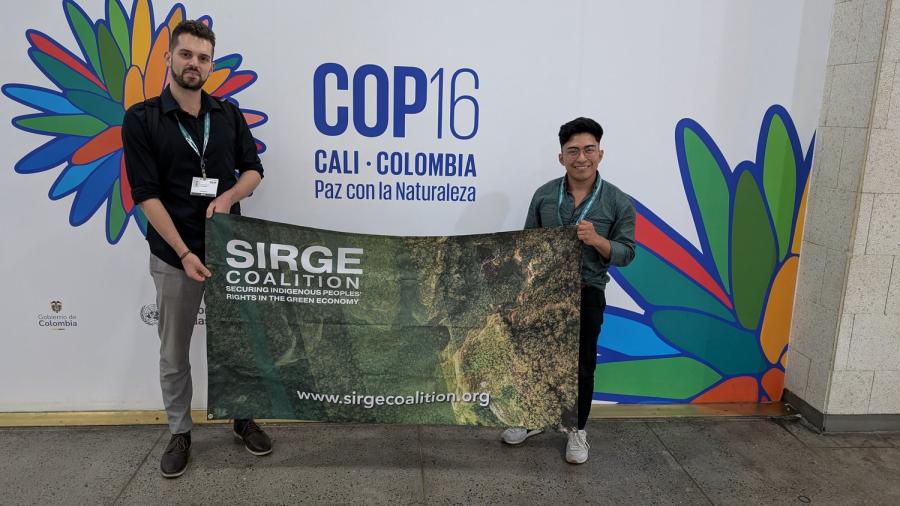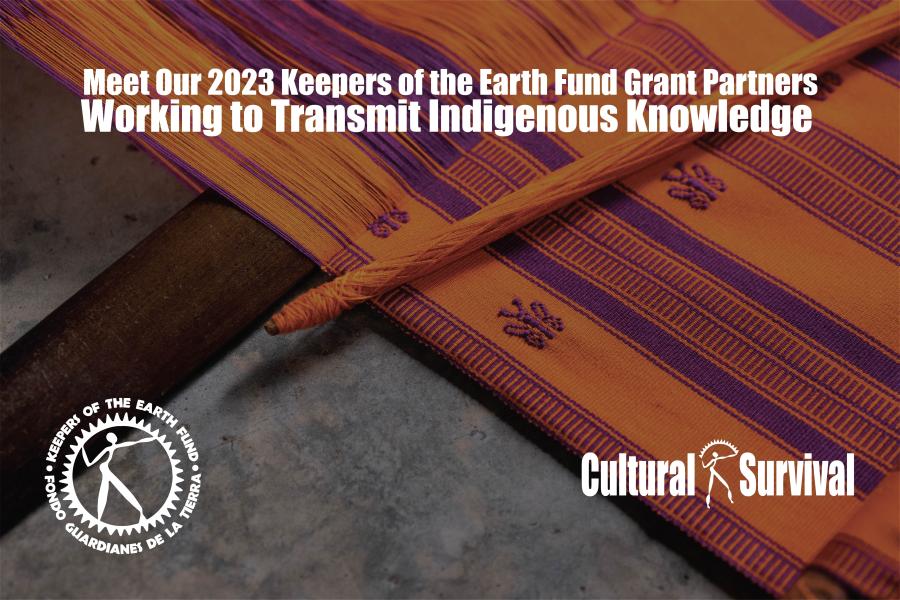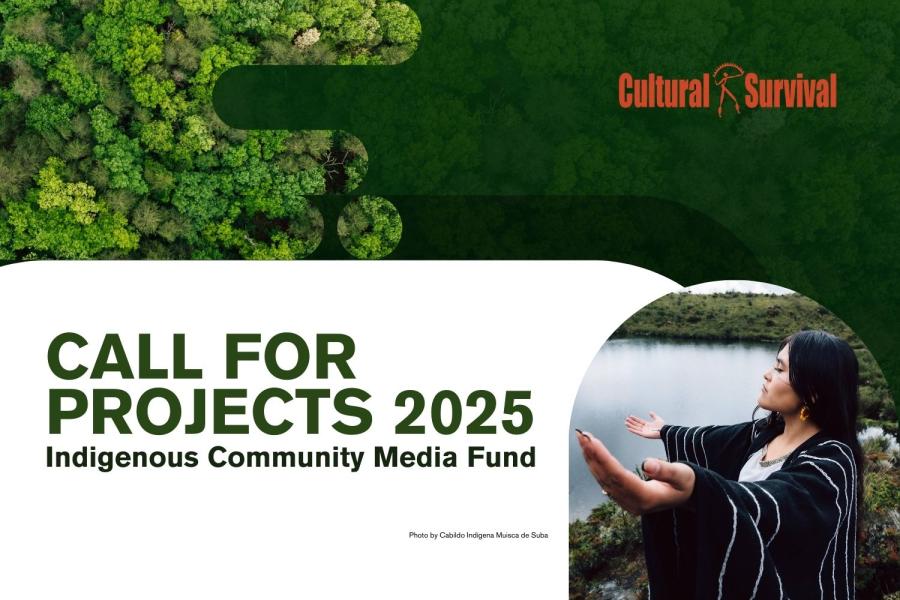
On January 5-7, 2022, the Launch Event for the International Decade of Indigenous Languages was hosted by the Cherokee Nation and the Global Indigenous Languages Caucus in Tahlequah, Oklahoma. The event focused on grassroots language revitalization efforts conducted by Indigenous communities across the globe. The most critical measure of language revitalization is the creation of new speakers, and this, along with securing adequate funding, needs to be the focus of the International Decade of Indigenous Languages. Resources need to specifically target Indigenous-led, community-based language programs that are built on immersion. Below is the outcome declaration from the event.
Tahlequah Declaration from the Grassroots Launch Event
5-7 January 2022 for the UN International Decade of Indigenous Languages,
Held at Cherokee Nation in Oklahoma, Turtle Island (USA)
As Indigenous Peoples of the world and collective members of the Global Indigenous Languages Caucus we stand in solidarity along with our diverse partners and supporters, raising our unified voices to deliver the following statement affirming, declaring and recognizing that our Indigenous and customary law and regulations – as expressed in our mother tongue Indigenous languages – precede those of contemporary occupying settler nation states.
We have joined together, both in person and virtually, from around the globe in celebration of the many languages that have been entrusted to the care of our Indigenous Nations. Indeed, all our rich Indigenous Knowledge and traditional practices are woven together and only expressed fully through the power of our living languages. Therefore, the main thrust of the International Decade of Indigenous Languages (IDIL) must focus on delivering support to grassroots language work.
We have gathered from both displaced Indigenous Nations and from our original lands. With our voices raised in our diverse languages through joyous songs, prayers, dances, stories, whistling language and poems, we share our overlapping histories of colonial violence, our successful strategies for securing the future of our languages during this Decade, and our visions for the future of our children over the next ten years.
We declare that our languages are the voices of the lands from which we originate and it is through our languages that we speak on behalf of Mother Earth. We take up the challenge to breathe new life into our ancient languages all around the world, so that our original languages will be revitalized. It is only through our Indigenous languages that the cultural health of our Indigenous nations can be strengthened and restored.
As the original bearers of sustainable lifeways that foster rich biological diversity, our Indigenous languages are key to restoring and regenerating a bountiful Mother Earth since we are now faced with the destructive extremes of a planet in crisis. The sustained attack on the global environment results from the same life-negating colonial systems that have assaulted our sovereignty, languages, lifeways, and our traditional relationships to the land. The struggle to protect land, water and biological diversity is intrinsically linked to the survival of our Indigenous languages. The assaults from extractive industries and wars of conquest waged by states, which devastate Indigenous Peoples and their territories are also destructive for our languages.
We declare that the most complete and appropriate response to physical and cultural genocide, including the planned brutalities of boarding schools, is to return our languages to their rightful places within the sacred spaces of our Indigenous homes. Getting our languages back into our homes as a first language is the ultimate end goal for natural language transmission that was beautifully modeled during our summit for future and ongoing use by Decade planners and other Indigenous communities. We call for more Indigenous families from all nations to join the circle of families now raising their children as first language speakers.
Our urgent message to the planners, stakeholders, and organizers for IDIL activities, is actually carried by the very presenters themselves of this initial gathering, who are community-based practitioners with proven success in creating new speakers of their Indigenous languages. Such authentic representation featuring grassroots advocates is vital throughout all planning and implementation of activities for the IDIL. These are the language advocates, along with other successful activists, who now stand as the world’s experts on language revitalization by virtue of creating new speakers within their communities. The message is that our languages can be saved, they are being saved, and we want others to learn from our struggles and join us.
Indeed, we state the simple and undisputed fact that the only way to create new fluent speakers is through immersion in the language. Through the presentations and workshops (available on- line at the website for Cultural Survival), we offer four types of immersion models that can be adapted for growing new speakers for other Indigenous language communities:
- Immersion schools are ideal for communities that can muster the cultural and financial resources to establish all-day educational programs in their own language. They are effectively taking the instrument of education historically used to bludgeon our languages and, instead, retooling the educational process to restore our languages and values.
- Master-Apprentice Programs as developed and presented by the Advocates for Indigenous California Language Survival (AICLS) are ideal for the vast majority of Indigenous communities with few speakers, teaching materials, and funding resources.
- Language Nests discussed by the Hawaiian presenters that feature a direct application of immersion language learning across generations with a focus on children as key learners.
- Ecovillage model, as demonstrated in the case of Ekvn-Yefolecv working through the Maskoke language, offers us the prospect of restoring community and returning to our lands in sustainable ways that can only be done through our original languages.
Guided by collective recognition of the centrality of our Indigenous languages to our lands, our diverse spiritual practices, and material cultures for carrying forward and protecting our lifeways, intellectual property, and inherent rights to self-governance and expression, we together declare the following goals as the most urgent for the IDIL:
1. Creating new young speakers within Indigenous communities is the principle goal for the Decade. This is a measurable goal that can be used as a prism for evaluating, planning and implementing other activities for the IDIL. We call for each Indigenous Nation to develop a 10 year plan for revitalizing its Indigenous language, that would include specific targets for youth.
2. Rematriation. We call for national legislation during the Decade modeled after the Native American Graves Protection and Repatriation Act (NAGPRA, 1990) in the United States that would focus specifically on rematriating Indigenous languages.
3. Grassroots Funding Support must become a central goal for the Decade in order to correct the extreme colonial imbalance in all work related to Indigenous languages for the last two centuries. This would require, at a minimum, a new 50-50 Protocol that would require matching every dollar spent on studying, dissecting, analyzing, or archiving our languages, with an equivalent amount being sent to Indigenous language communities to help them grow new speakers and keep their languages living within their own communities.
4. UN Convention. An important outcome for the Decade is to obtain the adoption of a legally binding UN Convention for the safeguarding and revitalization of endangered languages (for example, modeled after the 2003 Convention for the Safeguarding of the Intangible Cultural Heritage).
gOchathla gO’wAdAnAha Ônk’ajU TahA Ôk’afATA! (Yuchi)
Nwerna Ingkerreka urrkapanga ngketya nwernaka ikerita mparema! (Pertame)
Mamao Ahtâsketan tayahkotayahk Kipîkskwayinah! (Cree)
Omvlkeyat etohkvlket etemvtotket onmat, pum oponvkv svpeyetatos ce! (Maskoke)
“Together we can move our Indigenous languages forward” (English)



